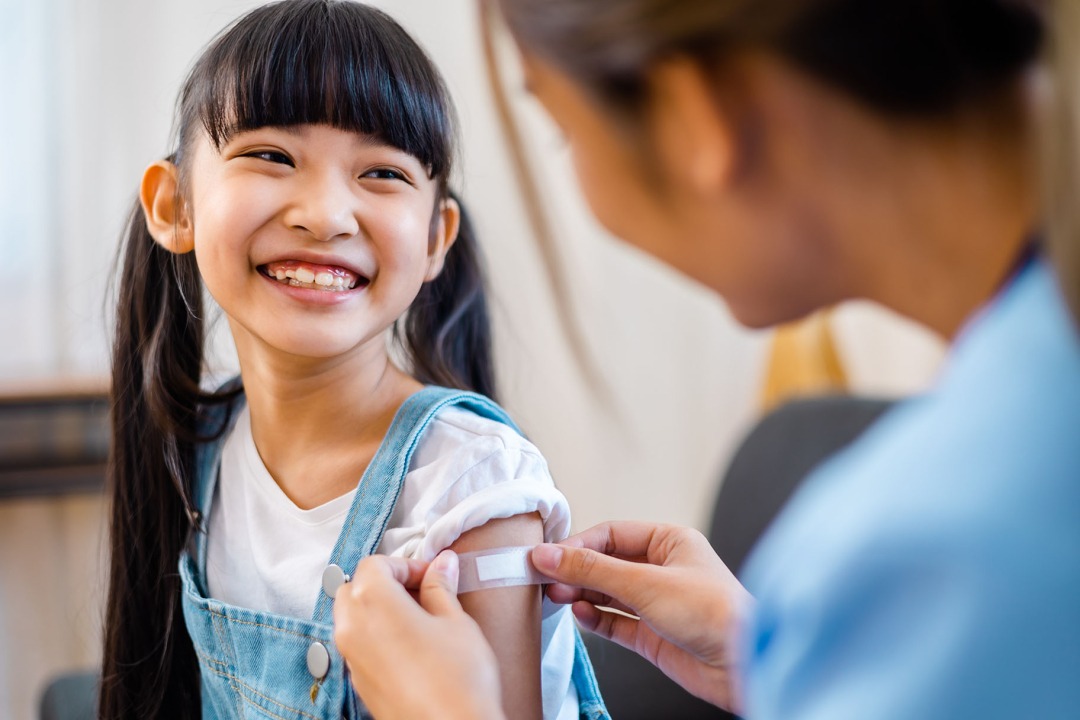Back to School Preview – Immunizations
Summer 2024

School is back in session for Southern Nevada students in a few weeks, and you may be thinking about ways to keep your kids healthy and protected from illness as they return to class. It just so happens that’s a subject that’s on the minds of the Southern Nevada Health District’s staff year-round! We spoke with some of them about the benefits of vaccines and why you should get ahead of the “back-to-school rush.”
- Chris Elaine L. Mariano, DNP, APRN, CPNP-PC, MSN, RN
Community Health Nurse Supervisor
Advanced Practice Registered Nurse - Maria Gueco
Community Health Nurse Supervisor - Alondra Contreras-Araiza
Senior Community Health Nurse - Ben Ashraf
Epidemiologist
Perspective:
To start, what is the simplest, best reason for parents to get their child or children immunized?
Chris
The best reason to immunize an infant, child or adult is to provide immunity from a potentially life-threatening disease. Immunizations help the body learn to fight off germs.
Maria
Another good reason is it’s not only for protection, but it’s also a requirement for the kids to enter child care facilities and schools.
Perspective:
Why is back-to-school season such an important time for immunizations?
Maria
Actually, we don’t think about it as just “back-to-school season,” it’s ongoing throughout the year. Sometimes it can become a last-minute rush when it’s time to register for school. We want to help parents keep their kids up to date with immunizations all year, so we have clinics open all year, January through December. Don’t wait for that rush!
Perspective:
How do you work with the school district to get that message out?
Maria
We stay in touch with the Clark County School District to provide information about immunizations, and the school district gives reminders to parents. We also have grants that let us put on pop-up immunization clinics in schools.
In 2022 we started the CCSD Family Support Center where we offer monthly immunization clinics. We have provided over 10,000 immunizations for more than 4,000 students.
Perspective:
Do we have similar partnerships with child care facilities, charter schools or private schools?
Maria
We offer information about our clinics at child care facilities, and have a website where parents can schedule appointments to get their children immunized: snhd.info/immunizations.
Perspective:
Ben, as an epidemiologist, you see how illness spreads and can impact the larger community. Why would you say immunization is important from a community perspective?
Ben
In an outbreak, germs can travel quickly through a community and make a lot of people sick. When enough people in a community are immunized, it can prevent outbreaks because those germs aren’t able to move as easily from a person who is infected into others. When germs have a harder time moving to and infecting new people, the entire community – even those who are unable to get immunized for medical reasons – is better protected. This concept is called “herd immunity.” But it does take a large percentage of the population being immunized to prevent that spread.
Perspective:
What questions or concerns are you hearing from parents about getting their child or children immunized?
Chris
One of the questions that I get is, “Are vaccines safe?” The answer is yes. Vaccines are safe. Vaccines are scientific achievements that have proven to reduce rates of disease and death all over the world. There are long-standing vaccine safety systems and process to determine the safety of each component of a vaccine. Each component of a vaccine is intended to perform a specific function to decrease and prevent disease.
I’m also asked a lot, “What are the benefits and risks of vaccines?” The main risks of vaccines are side effects – this can be something like a sore arm, redness at the site or even a low-grade fever. These side effects usually go away within 1-2 days. It is best to ask your primary care provider if you have any questions about the vaccines that you or your child might receive. Also, every vaccine has a Vaccine Information Sheet that contains information about what the vaccine does and potential side effects. Remember that not getting vaccinated involves a risk as well: not vaccinating can put infants, children and at-risk individuals at a higher risk of becoming seriously ill, or even suffering disability or death from disease. But I want to emphasize, vaccines are safe and do work against vaccine-preventable diseases, and the health benefit of preventing these diseases is much greater than the risk of side effects.
Alondra
Sometimes parents will ask, “Why can’t it just come in for one shot instead of multiple shots?” There are some combination vaccines, like MMR (Measles/Mumps/Rubella or Tdap (tetanus, diphtheria, and pertussis) parents may already be familiar with. I’ve been asked why there are more shots to get now than when they were kids. The answer is science: vaccine science is more advanced now than when we were growing up, and we’re able to prevent and protect from a wider range of illnesses than in the past. For example, some parents may remember getting chicken pox when they were young. We now have the Varicella vaccine, which protects kids from severe cases of chicken pox and has brought the overall number of cases down by more than 90% over the last 30 years.
Ben
It’s important to remember, there’s not just one standard set of questions; people come from different walks of life and have different concerns. I think what’s most important is that we provide parents with accurate, timely information and acknowledge the concerns parents do have. By letting parents know their concerns are valid, you can make them a little more comfortable about coming to you with these questions.
Perspective:
Ben, you’ve been involved in some recent surveys of the public about vaccines. Are there any challenges or even misunderstandings you’ve encountered?
Ben
One big thing we’re learned from our research is that many people are encountering barriers when they try to access immunizations. Things like not being able to get to a clinic or pharmacy if they work, or not having reliable transportation to get to those places.
It’s important for us to make it as easy as possible for people to get immunized when they want to. We’re doing this by getting out into the community to offer immunizations, like with pop-up and school clinics as Maria mentioned.
Chris
We do see that challenge with access: “Where can we get the vaccines, how much do they cost?” We hear that in our clinics, but also from private providers.
We know cost can be a big challenge. We accept most major insurance as well as government insurance like Medicaid. For infants, children and adolescents up to 18 years old who are uninsured or underinsured, we have the Vaccines for Children program that covers the cost of the vaccine. There is an administration fee, but the vaccines are free.
Perspective:
Maria, what are some ways for families to avoid the back-to-school rush?
Maria
We encourage parents to keep their regular check-up schedule with their health care provider. Those providers will know when immunizations are due and can help answer those questions parents have. We work closely with providers to make sure they have the most up-to-date information about vaccines, so they are a great resource for parents. Local pharmacies are available to schedule immunizations as well for children 6 and up.
We are a resource for the community year-round, and parents can schedule their immunization appointments at snhd.info/immunizations or call (702) 759-0850 to schedule an appointment if they don’t have access to the internet. We do have back-to-school clinics with appointments available at snhd.info/bts. But again, we encourage parents to avoid the rush and get their kids immunized early to beat the rush.
We are a resource for the community year-round, and parents can schedule their immunization appointments at snhd.info/immunizations or call (702) 759-0850 to schedule an appointment if they don’t have access to the internet. We do have back-to-school clinics with appointments available at snhd.info/bts. But again, we encourage parents to avoid the rush and get their kids immunized early to beat the rush.




